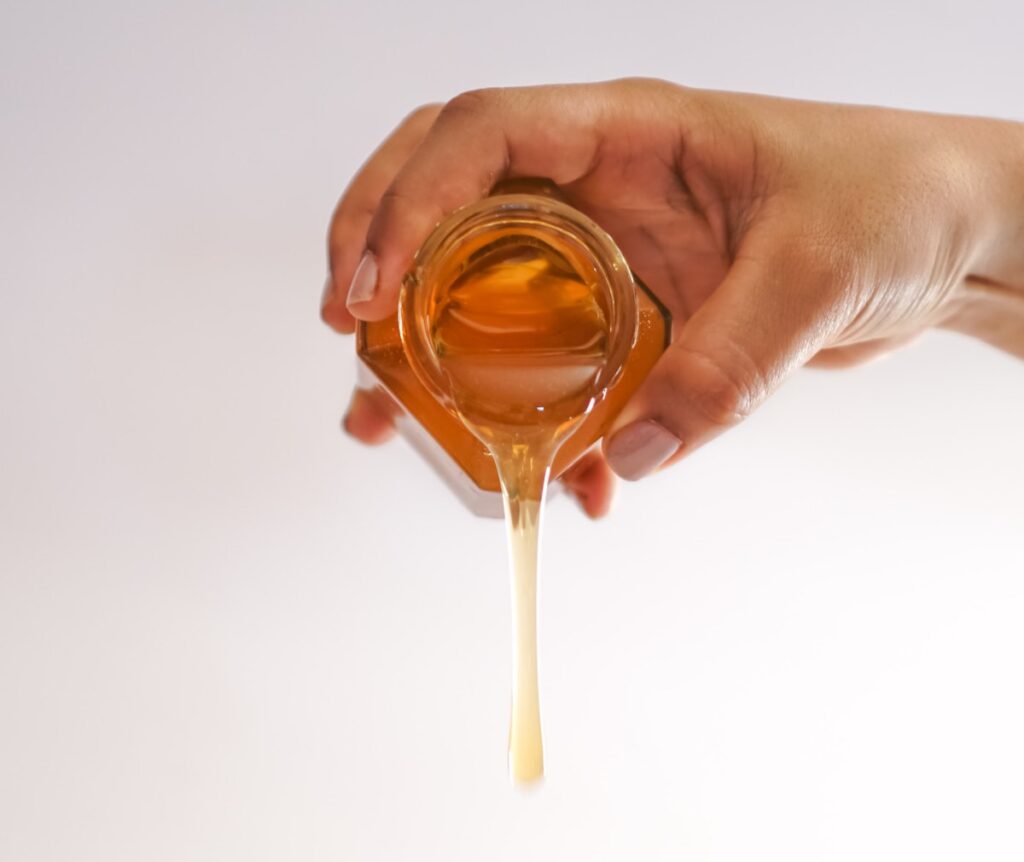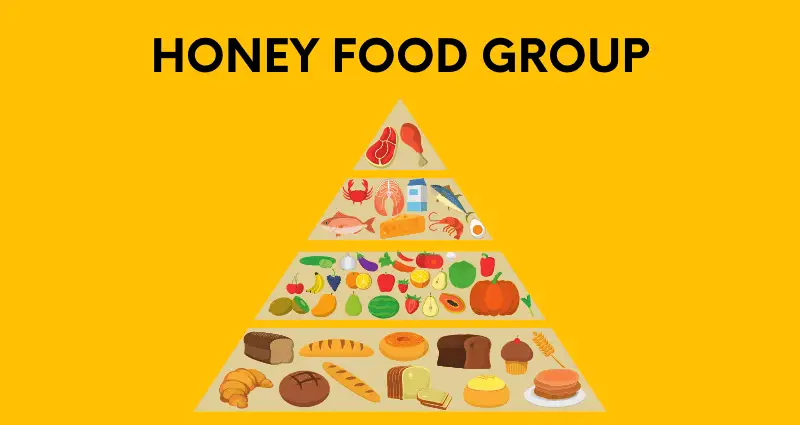What Food Group is Honey In?
Honey doesn't fall under a specific food group of the food pyramid, but the FDA has classified it as a carbohydrate and categorized it as nutritive sugar or sweetener.
Other nutritive sugars include agave, fructose found in fresh fruit, maple syrup, and high fructose corn syrup.
Sugar, also known as sucrose, has primary atoms of carbohydrates. While table sugar is extracted from sugar beets or cane, honey is from flower nectar. So, honey isn’t a food but a sugar under the carbohydrates group.
Don’t let this food category and classification scare you away from honey altogether. We need carbohydrates in a balanced diet.
What’s more, is that honey has many benefits that our body can capitalize on. Scroll down to read more about honey’s powerful nutritional benefits.

Health Benefits of Honey
Below are some remarkable raw honey benefits you should look to include in a well-balanced diet;
Enriched with Nutrients
Honey is rich in fiber, copper, vitamin c, antioxidants, magnesium, niacin, and calcium. Also, one tablespoon of honey holds 17 grams of carbs. It contains no fat; hence, it is an essential item in your diet.
Besides that, it has polyphenols, a healthy plant compound that comes from the floral source. It improves brain health and digestion. You also consume some essential amino acids, such as proline, tyrosine, and lysine when you consume this sweetener.
Improves Heart Health and Diseases
Sipping a few spoons of pure honey every day can reduce blood pressure and control your heartbeat. Besides that, this amazing stuff recovers your blood fat and improves its levels. Hence, it protects you from type 2 diabetes, high blood sugar, and metabolic syndrome.
Heals Wounds
People suffering from stubborn acne and diabetic foot ulcers should consider adding honey products and brown rice to their diet. Honey contains a propolis component, great for wound healing. Also, it has between 3.2 and 4.5 acidic pH to aid recovery.
Treats Diarrhea
Honey is a natural way to treat diarrhea. One tablespoon of natural honey, mixed with water, can treat your child’s diarrhea.
Multiple studies have shown considerable reductions in diarrhea when honey was consumed. And this study shows how honey reduced the number of bowel movements of patients with diarrhea.
Boost Immunity of Adults and Children
Upper respiratory disorders are regular discomfort in children. Hence, honey is made from a natural source; thus, a popular natural remedy with no side effects to treat colds and coughs in kids.
SAFETY TIP: Do not give honey to children under one year old. There is a risk of botulism.
Sweetener and Food Ingredient
In place of white table sugar, opt for pure honey when sweetening your tea, yogurt, or coffee. Also, add it when baking or cooking any type of food besides the above. So, when using this sweetener, note there are immense benefits of honey.
Bonus Point
One would ask what is honey good for besides the above benefits. Honey is food for bees made by worker bees, though women use it too for various purposes. It’s a great facemask, scar fader, bath soak spa, and you can mix it with lemon to reduce weight.
Manuka honey is a matchless type of honey with antiviral, antibacterial, and anti-inflammatory powers to perform the above tasks.
What is Honey Made of?
Bees make honey by collecting the nectar of flowers; hence, it is rich in various healthy components of a supersaturated solution. It has about 180 chemical compounds, which includes:
- Sugar as the chief component (hexoses, fructose, monosaccharides, maltose, and glucose)
- Traces of water
- Other minor ingredients like flavonoids and digestive enzymes
Besides that, it has the microbiological composition of:
- Bacteria – It carries harmless Bacillus bacteria
- Yeast – Honey with high moisture contains pure osmotolerant yeast that prevents fermentation.
Above all, its composition may vary depending on the flower nectar. Apart from that, its geographical origin is another factor in its content.
FUN FACT: Honey will vary in weight due to factors like nectar source, harvest season, bee type, location, and moisture content. Click here to learn more.
Honey Nutritional Information
1 tbsp (21 grams) of honey
| Calories | 60 |
| Carbohydrates | 17g |
| Total Sugar | 17g |
| Added Sugar | 0g |
| Sodium | 0g |
| Gluten | 0g |
| Fiber | 0g |
| Protein | 0g |
| Fat | 0g |
There are trace amounts of
- Minerals
- Vitamin c
- Zinc
- Potassium
- Iron
How Much Honey Should I Eat?
Like most foods, moderation is important. The American Heart Association recommends;
- Men – Less than 36 grams (9 teaspoons/150 calories) per day.
- Women and Children – less than 24 grams (6 teaspoons/100 calories) per day.
Sugar To Honey Ratios
It’s important to note that honey is about one-fifth water and retains its moisture a lot better than sugar. For this reason, reducing the amount of moisture used in a recipe may be necessary when honey is being used as a sugar substitute.
For the general kitchen substitute, here is a honey calculator to follow. We have included a few reduced liquids and baking soda recommendations as well.
| SUGAR | HONEY | REDUCED LIQUID | BAKING SODA |
| 1 Tablespoon (15mL) | 2 tsp (10mL) | n/a | n/a |
| 2 Tablespoons (30mL) | 1 Tablespoon (25mL) | n/a | n/a |
| 1/4 Cup (50mL) | 2 Tablespoons (50mL) | n/a | 1/8 Teaspoon (0.5mL) |
| 1/3 Cup (75mL) | 4 Tablespoons (60mL) | n/a | 1/4 Teaspoon (1mL) |
| 1/2 Cup (125mL) | 1/3 Cup (75mL) | 2 Teaspoons (10mL) | 1/4 Teaspoon (1mL) |
| 2/3 Cup (150mL) | 1/2 Cup (125mL) | 5 Teaspoons (25mL) | 1/4 Teaspoon (1mL) |
| 3/4 Cup (175mL) | 2/3 Cup (150mL) | 2 Tablespoons (30mL) | 1/2 Teaspoon (2mL) |
| 1 Cup (250mL) | 3/4 Cup (175mL) | 2 1/2 Tablespoons (37mL) | 1/2 Teaspoon (2mL) |
| 2 Cups (500mL) | 1 1/4 Cup (300mL) | 5 Tablespoons (70mL) | 1 Teaspoon (5mL) |
If you’ve gotten this far, you’re probably thinking of some great ways to use honey in your next recipe. One alternative that we love to use throughout our baking is Creamed Honey.
Health & Nutritional Benefits of Bee Pollen
Bees collect nectar and pollen to produce honey, but did you know that pollen has many health, nutrition, hair, and skin benefits?
You’ll find many benefits from consuming pollen from a boost to the immune and digestive systems, blood sugar regulation, and help with skin conditions. Click here to learn more about bee pollen benefits.

